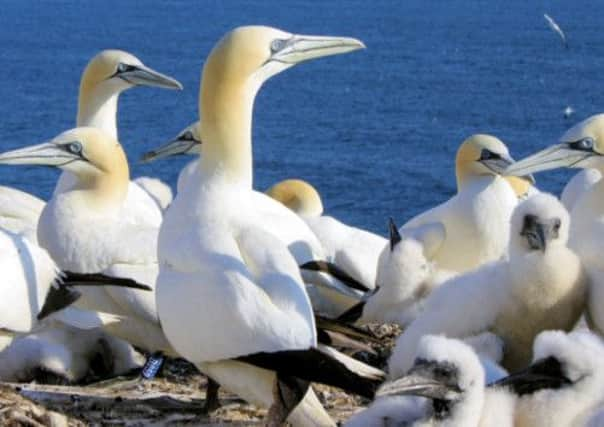Gannet by name but not nature – this bird’s a picky eater


There can hardly be a more spectacular sight in the British Isles than a flock of feeding gannets.
Like demonic white darts, they plunge en masse vertically from the sky, at seemingly terminal speed, before disappearing in an instant under the churning waves. With a two-metre wingspan, cruciform shape and holy white plumage, the gannet is our largest and most dramatic seabird.
Advertisement
Hide AdAdvertisement
Hide AdThese isles are its global stronghold with around 70 per cent of the world’s northern population clustered in a small number of colonies dotted around the Irish, Scottish, English and Welsh coasts, including Bempton Cliffs in Yorkshire.
For this reason alone, the gannet is a bird that we should be inordinately proud of. But, as its name implies, it suffers from something of an image problem.
People with overly enthusiastic eating habits are still often referred to as “gannets”, and for eons the bird has been something of a byword for gluttony and greed. True, the bird is a spirited gorger of almost anything it can snap up in that long dagger of a beak, with tales abounding of gannets observed with lengths of rope dangling from their bills.
But new research has suggested its reputation may be a tad unfair, and it is actually rather choosy about where it goes fishing.Gannets can fly hundreds of kilometres in a single fishing trip and it had long been assumed that they hunted wherever they could find food.
Advertisement
Hide AdAdvertisement
Hide AdBut researchers studying 12 key colonies around the British Isles and Northern France, discovered that the gannet was a far more fastidious fisherman.
Tiny match-box sized trackers were fitted to the birds and their movements were monitored. It was found that each colony held huge fishing grounds but, despite these populations sometimes being sited next to or near each other, the gannets didn’t trespass on their neighbours’ turf.
Rather than seeing criss-crossing flight paths as the birds headed out from their colonies, researchers studying the data found themselves plotting a strictly segregated map. The most noticeable example of this was seen off the west coast of Ireland, where gannets from two colonies, Bull Rock and Little Skellig, live within sight of each other but headed off in different directions to fish.
And intriguingly, these invisible boundaries were respected – despite the birds doing nothing whatsoever to protect them.
Advertisement
Hide AdAdvertisement
Hide AdCo-lead author Dr Ewan Wakefield, from the University of Leeds’ faculty of biological sciences, said: “We found the gannet colonies had neatly abutting and clearly defined feeding areas. Gannets may be a byword for gluttony but, clearly, they don’t eat off each other’s plates.”
So, what was going on – were the gannets more genteel than we had previously given them credit for?
Well, maybe not – it seems they stick strictly to their stretch of sea because they have learned over time, and from peers in their colony, that these areas are the best places to find food fast.
Joint lead author of the study Dr Thomas Bodey, from the University of Exeter, explained: “Gannets get their chance when shoals of fish are forced to the surface, often by predatory whales and dolphins, but when the gannets start plunging into the water and feeding on a shoal, the fish start diving.
Advertisement
Hide AdAdvertisement
Hide Ad“You have to be one of the first gannets to get there and that is where the maths comes in: if you go into an area that is being used by birds from a closer colony, there is a higher chance that individuals from that colony will be there first.”
So, the gannets stick to their own patch as they have a better chance of getting to food faster than birds from more distant rival colonies.
It is also believed that there are “cultural differences” acquired by the birds through learned behaviour between the colonies.
Dr Bodey explains: “Gannets readily follow each other when at sea.
Advertisement
Hide AdAdvertisement
Hide Ad“Finding such separation between colonies, even when visible from each other, indicates that competition for food cannot be the only explanation and suggests cultural differences between colonies may be important.
“As with humans, birds have favoured routes to travel, and if new arrivals at a colony follow experienced old hands then these patterns can quickly become fixed, even if other opportunities potentially exist.”
So gannets may not live up to their name, but if you are lucky enough to witness a feeding flock this summer, feast your eyes on one of our greatest wildlife spectacles.